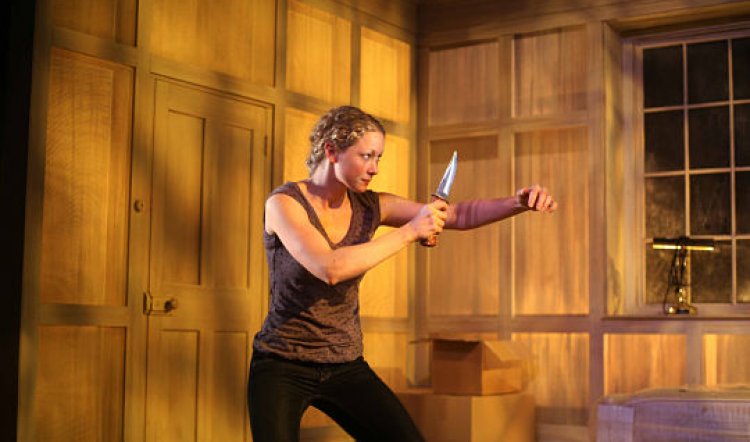
HAMLET
HAMLET, STC Ed at Wharf 2; March 18-April 8, 2011. Photos by Tracey Schramm
DIRECTOR NAOMI EDWARDS is a formidable talent with a light touch, bold ideas and the courage to follow them through. The result is a Hamlet as thrilling and thought-provoking as you could wish for – and possibly wouldn’t dream of seeing in anything less than a full-blown, big-deal, mega-costly, star-studded, super-hyped mainstage show. That’s to overlook the quality of the STC’s education program, however, and this production is right up there with the best on offer on any stage in the country.
Edwards has adapted Shakespeare’s greatest tragedy for a Gen Y cast and prime target audience. Hamlet, Ophelia, Rosencrantz and Guildenstern and the bulk of the audience are teenagers on the cusp of possibility, teetering on the brink of maturity with all the fears and thrills of adult life looming ahead. And the audience is coming to adulthood – with its attendant responsibilities – at a time when their society is as corrupt, venal, disappointing and dishonest as they see it in the royal court of Denmark of four hundred years ago. (And others across Europe, of course, Shakespeare wasn’t silly enough to overtly finger the Elizabethan rat’s nest.)
How then to help them identify with the grief, mourning, betrayal and rage that afflicts the princeling of the title? This Hamlet is a young person coming to terms not only with the death of a beloved father, but also the realization that there is no moral compass to guide the traveler in what is now a dark, dangerous and unfamiliar place. And how to distract a knowing (adult) audience from their inevitable preconceptions and familiarity with the play? These were the director’s central quandaries and she has overcome them with blinding ease: she has made Hamlet a girl, and Horatio and Rosencrantz too; while Laertes (excellent Cameron Goodall, doubling as Guldenstern) is the necessary and credible spunkrat.
In her notes (download the pdf from the STC website, they’re worth reading) Edwards writes inter alia: “Everyone comes to Hamlet, both audience and artists, with an idea of who he is, why he acts – or doesn’t act – the way he does, and can quote – and misquote – the famous lines, even if they have never seen or read the play.” So, by casting the marvelous Sophie Ross as Hamlet and the differently marvelous Holly Austin as his friends Horatio and Rosencrantz, these characters are strangely and instantly at one with the teenaged audience and the adults are stopped dead in their wondering “how’s he going to deal with ‘to be or not to be…’ And the result is wondrous to behold.
It’s up to you to decide: Hamlet may or may not be gay; and may or may not love Ophelia in a way other than the profound passion of youthful best friendship; for many girls the difference between the two states is almost imperceptible anyway. What happens here, however, is that Ross’s dynamic, androgynous performance – both softly feminine and steely strong in ways that women instantly recognize – releases the players, the text and the communal imagination from all assumptions and prejudgments. It’s rather like watching a new play and when Hamlet (in the main) gives voice to some of the most famous lines in the English language the effect is electrifying.
It also helps that Rosencrantz and Guildenstern are reconfigured and foregrounded through music and musical characterizations that are so contemporary they just about make your eyes bleed, while making more sense of these two than I can ever recall. Horatio (Austin’s second role), on the other hand, is the classic nervously bespectacled geeky acolyte that every head girl/sports captain attracts to her team.

The contemporary mood also brings another layer of meaning and tragedy to Ophelia’s place in the drama as Julia Ohannessian trippingly moves from the sweet love for her dear Hamlet to the self-destructive misery as she experiences betrayal and loss – of Hamlet and his murder of her father Polonius (Andrew James). Teenage suicide was never more succinctly placed in context and Hamlet’s murderous rage likewise. Again, as Edwards observes in her notes: “The adults are no longer caring for their children. They have become an inconvenience to their plans, and functions of their treachery. To highlight the adult surveillance and manipulation of these adolescents for their own end heightens both Hamlet and Ophelia’s tragedy. They are not equals in status or power to their parents and new parents.”
Being powerless and ruled by the heedless whims of adults is the deepest unifying factor for Hamlet and her audience. Not only has her king and father been murdered by his own brother, but the queen, her mother, is now in the usurper’s bed and happy in it. Rage, disgust, hatred and revenge are the logical and reasonable outcome; particularly when Hamlet’s mother is the warm, attractive and maternal Gertrude of Sarah Woods and the usurping Claudius could be a Kings Cross brothel-keeper or drug dealer (Lech Mackiewicz).
The latter, unfortunately, is the production’s only weak link, being an oddly wooden presence, for one thing, but rather more seriously, it’s difficult to understand him. Even a voice and text coach as talented as Charmian Gradwell seems unable to penetrate the depths of this Polish accent. It makes the first ten minutes of the play trying; but then he pretty much shuts up, so doesn’t then detract from the rest of this otherwise brilliant production.
Set and costume designer Andrew Bellchambers makes a terrific debut with characterful clothes and a two-walled room through which the ghost can walk and that conjures the probably grimly plain interiors of a provincial palace – made chilly and atmospheric by lighting designer Verity Hampson. Sound designer and composer Steve Francis works alongside the onstage presence of Austin and Goodall, who are also credited as composers and whose work adds hugely to the whole. And finally, fight choreographer Scott Witt turns what can often be a clunky scene of Hamlet’s fatal clash with Laertes into a heart-in-the-mouth series of little tragedies culminating in the final moment of mass murder.
This Hamlet is a tremendous achievement and in these hands is as confronting, tragic and extraordinary as it must have been when first staged. Whether you’re in high school or not, you should see it.



